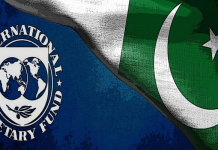LAHORE, MAR 2: /DNA/ – The Ferozepur Road Industrial Association Lahore (FRIA) has said that in a bid to ensure prudent utilization of public money, the upcoming government should introduce an austerity plan that included ban on purchase of all vehicles and ban on purchase of machinery and equipment.
Fria senior vice chairman Shahbaz Aslam said that there shall be a complete ban on purchase of all vehicles except ambulances, buses for educational institutions, solid waste vehicles, tractors, fire fighting vehicles, motor bikes; and there shall be ban on creation of new posts under PSDP/current budget during Financial Year 2023-24.
The government’s austerity measure needed at the time when the country’s budget deficit was increasing. The consolidated fiscal deficit has been recorded at 2.3 percent of GDP (Rs2407.8 billion) in first six months (July-December) of the current fiscal year FY2024 against 2.0 percent of GDP (Rs.1683.5 billion) last year. While a primary surplus witnessed a continuous improvement due to contained growth in non-mark-up spending relative to markup payments. Primary surplus improved to Rs.1812.2 billion (1.7 percent of GDP) during Jul-Dec FY2024 from the surplus of Rs.889.6 billion (1.1 percent of GDP last year. Total expenditures grew by 45 percent to Rs.9261.8 billion during Jul-Dec FY2024 against Rs.6382.4 billion last year. Within total, current spending increased by 41 percent mainly due to a 64 percent rise in markup payments during the first six months of the current fiscal year, according to the latest data of the ministry of finance.
Shahbaz Aslam called for keeping check on government expenditure and high cost of debt servicing, as the federal government debt has surged to a staggering Rs64 trillion, reflecting an alarming increase of over 29 percent in just one year. He said that this unsettling trend has raised concerns about fiscal sustainability and the adverse impacts of steep currency devaluation come at a time when the World Bank has cautioned Pakistan about the growing risks of its macro-economic framework.
Quoting the State Bank of Pakistan report, he said that the federal government’s debt has soared by Rs14.5 trillion, constituting a substantial 29.2 percent rise compared to the same period last year. This rapid escalation in debt is widely seen as unsustainable, yet corrective measures to curb this alarming trajectory have not been implemented. The PIAF chairman said that the debt burden is gradually increasing because of insufficient tax revenue collection that forced the government to borrow from the domestic and external resources to finance the soaring fiscal deficit.
For the past one and half year, the country is facing a serious financial crunch and continually relying on borrowing to meet its financial needs.
The growing debt stock carries significant fiscal costs and exposes the country to debt vulnerabilities, as highlighted in the Pakistan Development Update report by the World Bank. He also emphasised that persistent fiscal deficits and debt repayments have resulted in consistently high annual gross financing needs, averaging 27 percent of GDP over the past decade. This level is notably higher than the emerging market threshold of 15 percent.

















